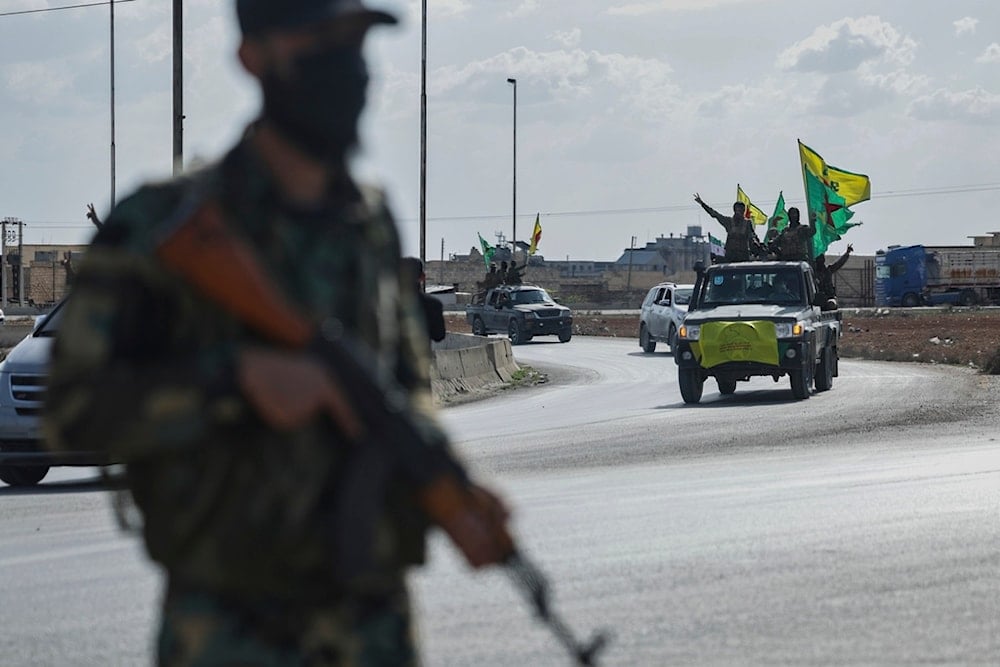Commander appointed in Syrian interim government sparks Kurds outrage
The appointment of Ahmad al-Hayis as head of the 86th Division in northeastern Syria draws condemnation over past abuses against Kurds and ongoing Turkish influence in the interim government.
-

US-backed Kurdish fighters stand on their vehicles, as they withdraw from two neighborhoods in Syria's northern city of Aleppo as part of a deal with the Syrian central government, in Aleppo, Syria, Friday, April 4, 2025. (AP)
The Syrian interim government has appointed Ahmad al-Hayis, known as Abu Hatim Shuqra, a former commander of the Ahrar al-Sharqiya faction, as head of the newly formed 86th Division, tasked with securing the provinces of al-Hasakah, Raqqa, and Deir Ezzor.
The decision, issued by interim Defense Minister Murhaf Abu Qasra, also grants al-Hayis the rank of brigadier general in what is being called the "new Syrian army."
The appointment has provoked strong condemnation from Kurdish sources and groups affiliated with the US-backed Syrian Democratic Forces (SDF), who view it as a provocative move given al-Hayis's notorious record.
Shuqra is widely accused of leading one of the factions most involved in serious human rights violations against Kurdish civilians in Afrin and Ras al-Ain, following their occupation during the Turkish-led military offensive Olive Branch in 2018 and Peace Spring in 2019.
Involvement in assassinations?
Among the most serious accusations leveled against al-Hayis is his alleged involvement in the assassination of Kurdish politician Hevrin Khalaf, Secretary-General of the Future Syria Party, who was killed in October 2019 while traveling on the M4 international highway near the town of Suluq in Raqqa's northern countryside.
In response to this and other documented abuses, the US Treasury Department sanctioned Ahrar al-Sharqiya in 2021, citing extrajudicial killings and gross human rights violations.
The group has also been accused of massacres targeting Alawites in the coastal region and abuses against Druze communities in Ashrafiyat Sahnaya.
US calls for accountability
In response to the appointment, US Deputy Representative to the United Nations Dorothy Shea stressed on Tuesday that all those responsible for recent violence, especially individuals in leadership roles, must be held accountable. "This will send a clear message to all Syrians that no one is above the law in the new Syria," she said.
Kurdish sources told Al Mayadeen that the appointment of Abu Hatim Shuqra, preceded by a similar controversial designation of Muhammad al-Jassem (Abu Amsha), is seen as an attempt to provoke the SDF and Kurdish communities broadly, particularly in Afrin, where more than 200,000 Kurds were forcibly displaced over the past seven years.
Derailing peace efforts?
The same sources pointed to Turkey's overarching influence on decisions within the Syrian interim government, accusing Ankara of pushing policies meant to derail reconciliation efforts between Damascus and the SDF leadership.
"These decisions undermine recent attempts at rapprochement and suggest that the interim government is not serious about honoring the latest agreements," one source stated.
Kurdish figures have called for leadership appointments that respect the unique sensitivities of each region and contribute to national unity rather than deepen tensions or risk further conflict.
SDF ends mobilization in Tishreen Dam
The so-called Autonomous Administration in northern and eastern Syria has announced the end of a state of popular and military mobilization around the Tishreen Dam in the northeastern Aleppo countryside, after over 100 days of what it described as a "popular resistance" against attacks targeting the facility.
In an official statement, the administration claimed that the dam had been under repeated attack by factions supported by Turkey since the beginning of the year, threatening a vital infrastructure that provides water and electricity to millions of people in the region.
The statement noted that the mobilization witnessed broad civilian participation alongside the US-backed Syrian Democratic Forces (SDF) and the Women's Protection Units, which contributed to repelling any attempted advances toward the dam. While the mobilization has ended, the administration emphasized continued vigilance against future threats.

 4 Min Read
4 Min Read








